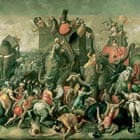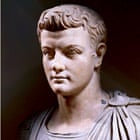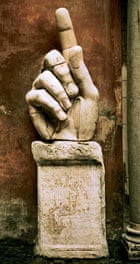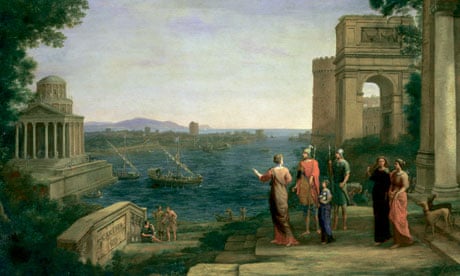Ever since her fall, Rome has served the west as the very archetype of empire. Predatory, intimidating and ineffably glamorous, her civilisation was both eerily like our own, and utterly, astoundingly strange. It is this tension, between what is familiar and what is not, that best explains the fascination that Rome still holds for us to this day. The famous words that Edward Gibbon applied to her ruin might well describe the entire parabola of her thousand-year rise and fall. "The greatest, perhaps, and most awful scene, in the history of mankind."
At its heart lies a mystery as profound as any in the records of human civilisation. How did the Romans achieve all that they did? How did a small community, camped out among marshes and hills, end up ruling an empire that stretched from the moors of Scotland to the sands of Arabia? So solidly planted within our imaginations are the brute facts of this rise to superpower status that we have become, perhaps, desensitised to the full astonishing scale of the Roman adventure. Virgil, the great laureate of his people's achievement, saw in it the fulfilment of a mission entrusted to them by the gods. "Your task, O Roman," he wrote in celebrated lines, "is to rule and bring to men the arts of government, to impose upon them the arts of peace, to spare those who submit, to subdue the arrogant."
Rome's enemies, unsurprisingly, were inclined to interpret her motives a little differently. "Warmongers against every nation, people and monarch under the sun," spat Mithridates, an Asiatic king of the first century BC who devoted his life to resisting the encroachments of Roman imperialism. "They have only one abiding motive – greed, deep-seated, for empire and riches." So it has ever been, of course: one man's peacekeeper will invariably appear another's brutal aggressor. Yet both Virgil and Mithridates, profoundly though they may have disagreed as to the character of Rome's dominion, had not the slightest doubt as to what had made it possible. Her truest talent was for conquest. There were other peoples, perhaps, who excelled the Romans in the arts, or in philosophy, or in the study of the heavens, but there were none who could match the legions on the battlefield. Rome's greatness was won and maintained, above all, by her genius for war.
The city's destiny had been manifest in her origins. Rome was founded, according to tradition, in 753BC, by Romulus, her first king: a man who had drunk in savagery from a she-wolf's teat. The story of this suckling was one that always caused the Romans some embarrassment – for it was the habit of their enemies to condemn Rome as "the city of the wolf." Yet the image of the Romans as a killer breed, sniffing the wind for prey, and feasting on raw meat, only told half the story. Their undoubted aptitude for violence was mediated by a characteristic no less potent: a steely admiration for self-control. When the son of Rome's seventh king, ignoring this, raped a prominent citizen's wife, the scandalised Romans abolished the monarchy altogether and replaced it, in 509BC, with a republic.
Later generations would pinpoint this as the moment when Rome came of age. Yet in truth, for a century after the expulsion of their last king, the Romans struggled to establish their city as anything particularly notable. Then, in 390BC, came the experience that transformed the Republic into a state authentically mutant and lethal. An invading horde of barbarians from the north wiped out an entire Roman army, swept into Rome itself, and pillaged the city mercilessly. A salutary and shocking humiliation – and the episode, more than any other, that served to put steel into the Roman soul. The Republic, from that moment on, was resolved never again to tolerate defeat, dishonour or disrespect.
Expanding of the empire
Slowly at first, and then with increasing self-assurance, the Romans pushed back the limits of their supremacy. By the 260s BC, they had established their city as the mistress of Italy, and by 241, after a terrible war lasting 24 years, succeeded in defeating the great naval power of Carthage, and establishing their first overseas province.

It was not in victory, however, that they best demonstrated the unique fortitude of their character, but in catastrophe. In 218BC, a Carthaginian general named Hannibal renewed his city's war against Rome. Two years later, on 2 August 216, he subjected the largest army that the Roman Republic had ever put into the battlefield to utter defeat. More soldiers, it has been estimated, were slaughtered in that single day's fighting than were killed on the first day of the battle of the Somme – and the scene of carnage, it is said, "was shocking even to the enemy." The battle of Cannae, the greatest victory of Rome's greatest enemy, annihilated perhaps a fifth of her available manpower, and it was the natural presumption of Hannibal that she was now bound to sue for terms.
But she did not. Against all the conventions of warfare at the time, implacably and barely believably, the Romans fought on. In due course, completing one of the most sensational comebacks in military history, they emerged triumphant – first against Hannibal, and then against anything that any power anywhere could throw against them. By the first century BC, Rome was the undisputed queen of the Mediterranean.
This was unprecedented, in that huge empires had often been won by monarchs before – but never by a republic. To the Romans themselves, as startled as everyone else by the scale of their rise to dominance, it appeared self-evident that their liberty and their greatness were different sides of the same coin. The values that gave breath to the Republic, the rituals and codes of its citizens, its extremes of ambition, self-sacrifice and desire: these, it seemed to the Romans, were what had enabled them to conquer the world.
"It is almost beyond belief how great the Republic's achievements were once the people had gained their freedom, such was the longing for glory that it lit in every citizen's heart." So wrote Sallust, Rome's first great historian. There were few of his fellow citizens who would have disagreed.
Seeds of destruction
Political rights at home, and expansive conquests abroad: a combination that made the Republic the most potent state in the world. Yet, as in all the greatest tragedies, in its ideals and virtues lay the seeds of its fall.
Liberty, in the Republic, meant the right of its citizens to compete with one another, and test themselves to the very limit. Throughout the Republic's history, its great men had sought to win glory. As Rome's power grew, so the scope for conflict grew as well. In the final anguished century of the Republic's existence, Rome's greatest generals began to win vast resources for themselves. The consequences of this were soon to become grimly apparent.
By the 50s BC, a citizen named Julius Caesar, who as governor of Gaul had succeeded in conquering 800 cities and 300 tribes for the Republic, had also secured for himself the capacity to menace the Republic with destruction.
So it happened, in the last half of the 1st century BC, that a series of terrible civil wars were fought. Out of these, first Julius Caesar and then his great-nephew, Octavian, emerged as the undisputed masters of the Roman world. The Republic, having lived by the sword, had duly perished by the sword.
The only alternative to anarchy and the total breakdown of Roman power, it appeared, was military dictatorship – and that, in a sense, is precisely what Octavian provided. Yet his genius was to hide it. The Romans, weary of the militarism that had brought them their greatness, now found themselves preferring the comforts of slavery and order to the turmoil of liberty and chaos. Octavian, awarded the splendid honorific of the "Divinely Favoured One" ("Augustus") – banished the legions from Italy to the distant frontiers, and proclaimed the dawning of a new and universal era of peace. It was the measure of his success, perhaps, that the word imperator ("general") used during his reign should have evolved to mean something much more – our word "emperor". The poet Virgil, whose epic poem the Aeneid was the supreme masterpiece of an unprecedented efflorescence of Roman literature, hailed Augustus as a man destined to "bring back the age of gold" – and so, by and large, it proved.
A reputation for decadence
A later generation of writers, however, would look back on the regime established by Augustus with more jaundiced eyes. It is thanks to Suetonius – the founder of racy biography, and above all to Tacitus – greatest and most mordant pathologist of autocracy – that the court of the Caesars remains to this day the very model of lurid decadence. Augustus, so Tacitus pointed out, had persuaded the Romans to accept his mastery by pretending they were still free. But his successor, Tiberius, made his contempt for what they had become far more evident. He ruled from his villa in Capri, where slave boys could nibble at his genitals while he enjoyed a relaxing swim. Meanwhile, back in Rome, the absent emperor's authority was maintained by terror: wholesale pogroms wiped out members of the city's leading families, while toppled ministers might be hauled through the streets with meathooks through their mouths.

Only when the aged Tiberius was finally smothered beneath a pillow by Caligula, his impatient heir, did the Roman people breathe easily again. But Caligula was soon to show himself the most terrifying emperor of them all. "I wish all Rome had one neck," he cried on one occasion; and on another: "Let them hate me, so long as they fear me."
Yet even he did not inspire in subsequent generations the appalled fascination with which his nephew, Nero, would inspire: he was remembered by the Romans as a man who had killed his mother, married a eunuch, and burned down half of Rome. Read only the pages of Tacitus, and it would appear that the entire world had become a slaughterhouse.
In truth, however, barring one flare-up of civil war in the wake of Nero's typically histrionic suicide, the peace established by Augustus across the broad sweep of the empire held. The occasional conquest was still made – Britain, for instance, in AD43. And in Judea, between AD66 and 135, a succession of Jewish uprisings were brutally suppressed, with fateful consequences. For two centuries, however, the Pax Romana (Roman peace) was something very much more than sham. It did serve to bring order and prosperity to an immense swathe of territories – and prolonged peace, in the ancient world, was a condition sufficiently rare to justify Roman self-satisfaction. Indeed, never in human history had so many people lived for so long without experience of war.
Throughout the second century AD, a succession of Caesars, disdaining the excesses of a Caligula or a Nero, and the risk of assassination that they brought, sought to rule with "the governing wisdom that comes from laws," rather than through direct intimidation and violence. Here, for the Roman people, was reassurance that they did indeed remain in communion with all that was noblest from their past. Right from the very earliest days of the Republic, they had always been intensely proud of their legal system. Indeed, it was the only intellectual activity that they felt entitled them to sneer at the Greeks. They knew that it was what defined them – and that still, even under a monarchy, it was what continued to guarantee them their civic rights.
As for their masters, these, by and large, laboured nobly and well. An emperor such as Hadrian, rather than lounging about in a pleasure palace, was instead a tireless traveller across the length and breadth of his dominions, even visiting its chilliest and outermost limit, the north of Britain. Hadrian's real love, however, was Greece – so much so that, in Athens, a gateway below the Acropolis proclaimed that "this in times past was the City of Theseus, but no longer, for now it is Hadrian's." The beautification of Athens had been promoted with a passionate enthusiasm: for Hadrian hoped that, in Greek culture, he might find a glue to stick together all the disparate elements of his empire. Sure enough, with each succeeding generation, his vision of Greece and Rome as the twin poles of civilised accomplishment came to seem ever less idiosyncratic – and the empire itself steadily more Graeco-Roman. No wonder, then, that by the 2nd century AD, even distant provinces were increasingly proud to call themselves Roman, and eulogised the world's capital in gratitude.
Decline and fall
Except that increasingly, in the shadow of the millennial anniversary of Rome's founding, there were weeds to be found in the garden, and spreading brambles. By the third century AD, legions on the frontiers had begun to discover that rewards potentially far richer than peace-time pay were to be had by promoting the interests of rival Caesars. Simultaneously, as the Roman world collapsed into civil wars more internecine even than those that had destroyed the Republic, a fresh catastrophe loomed. In Persia, for the first time, an enemy emerged, in the form of the Sasanian monarchy, capable of directly menacing Rome's dominions in the east. In AD260, an emperor, the elderly Licinius Valerianus, was even taken prisoner. The wretched captive, still garbed in his imperial purple, was reputedly used by the Persian king as a mounting block for climbing on to his horse. When Valerian, worn out by his humiliations, finally died, his corpse was flayed, and the empty skin filled with straw.
A potent symbol, perhaps, of an empire in irrevocable decay? So it might have seemed – and yet the Roman order, redeemed from apparent collapse, emerged during the fourth century upon a new and formidable footing. True, the empire was one markedly different from that of three centuries before. Whereas Augustus, "that subtle tyrant", had sought to veil the true foundations of his authority, the emperor Diocletian ruled nakedly as a king – something the Romans, back in their early history, had always been most proud to resist. Power, which had once resided far from the frontiers, now dwelt instead far from Rome, among the military strongholds that lined the empire's outer limits. Indeed, in a sense, the entire Roman world had been transformed into an armed camp: an autocracy of blood and steel.
Legacy

It has always been tempting, particularly under the influence of Gibbon, to cast the final centuries of the empire as a period exclusively of decline and fall. But the truth is that the revolution witnessed during the fourth and fifth centuries AD was destined to profoundly influence the future course of global history. In AD312, as he was about to engage with a rival for the throne, a brilliant young general named Constantine had a vision of a great cross in the sky. When he emerged victorious, he attributed his triumph not to the ancient gods of Rome, but to the god of a hitherto reviled and persecuted sect: the Christians. Constantine's reign was to see Christ transformed into the partner of a Caesar – and his church into a tool of imperial control. A fateful development indeed: for, in the long run, the establishment of Christianity as a state religion would provide a model fit to inspire popes and caliphs alike. As for the Roman Empire itself, Christianisation provided it with a new lease of life. In the west, the structures of the imperial church were destined to long outlast those commanded directly by the Caesars. In the east, transformed into something wholly new, it would endure for a further millennium as an empire we now call Byzantine. As its capital, it would have Constantine's own foundation, Constantinople: the self-proclaimed "second Rome". The old order had ended – a new age had begun.
Tom Holland is the author of three works of history: Rubicon, Persian Fire, and Millennium. He is currently writing a book on late antiquity and the origins of Islam. He has adapted Homer, Herodotus, Thucydides and Virgil for BBC Radio and is currently working on a translation of Herodotus for Penguin Classics
